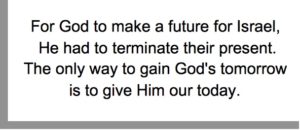 We need to take a few steps back from the immediate context of Judah in Babylonian captivity to see into the spiritual realm where God’s people need rescuing from this evil age. The message, in other words, is eschatological as well as historical. God’s people will return not just to the Old Jerusalem but to the New One as well.
We need to take a few steps back from the immediate context of Judah in Babylonian captivity to see into the spiritual realm where God’s people need rescuing from this evil age. The message, in other words, is eschatological as well as historical. God’s people will return not just to the Old Jerusalem but to the New One as well.
The prophet makes no mention of God’s people as the sheep of His fold. [Psalms 23] The reason I choose to describe Judah’s salvation as a rescued lost lamb? Jesus did. [Mt. 18:12-13; Jn 10:7, 11, 27; 21:17]. I am also more comfortable with the Hebrew term translated “lie down” in 3:13, which the lexicon tells us is “used of quadrupeds.” In Genesis 29:2 it is used specifically of sheep. The word “eat” here means “to graze.” Also, the words “scattered” in 3:10, “oppressed” and “lame” in 3:19 remind me of Matthew 9:36. These are only a few of the many scriptures using this analogy.
Zephaniah prophesied of Israel’s—and by extension all God’s children’s—ultimate restoration. As Walter Brueggmann summarized,
It is the same “warrior” who makes a future for Israel who had terminated Israel’s present. – [“An Introduction to the Old Testament, 2012. p 279]
 Zephaniah 1:15 uses troubling language: 2 words for tribulation (no way out) “That day will be a day of wrath— a day of distress and anguish, 2 words to speak of total ruin, a wasteland “a day of trouble and ruin, and 3 word to describe absolute darkness (spiritual and in every other way) a day of darkness and gloom, a day of clouds and blackness
Zephaniah 1:15 uses troubling language: 2 words for tribulation (no way out) “That day will be a day of wrath— a day of distress and anguish, 2 words to speak of total ruin, a wasteland “a day of trouble and ruin, and 3 word to describe absolute darkness (spiritual and in every other way) a day of darkness and gloom, a day of clouds and blackness
The Scriptures intertwine, though, for one cannot talk of restoration without talk of peace. And even though the word SHALOM, peace, is not on the prophet’s lips, it is the beat of his heart. As Micah said it:
Everyone will sit under their own vine and under their own fig tree, and no one will make them afraid, for the LORD Almighty has spoken. Micah’s 4:4
There are other lessons here. I tried to put some in a poem, but the one overarching one to take away is that God discovered us in the “lost [life ] & found.” [Luke 15:4]
Zephaniah is the prophetic account of a nation that had to discover that the only way to gain tomorrow was to lose today. God had to allow circumstances to humble them, to purge them of a pride that kept them from trusting Him.
But I will leave within you the meek and humble. The remnant of Israel will trust in the name of the LORD. Zephaniah 3:12
Jesus gave us this lesson on perhaps a sunnier day while picnicking on some remote hillside. We listened enthusiastically hanging on His every word, though, perhaps, we may have failed to understand the dynamic in such an idea:
Whoever tries to keep their life will lose it, and whoever loses their life will preserve it. Luke 17:33
This life and its sufferings are not what its ultimately all about. [Matthew 5:10-12; 6:20; 2 Corinthians 4:17-18] The Beatitudes may have been an early lesson in such truth. It was John, perhaps, who first perceived what the Savior was promoting.
Anyone who loves their life will lose it, while anyone who hates their life in this world will keep it for eternal life. John 12:25
“Lose …hate”!? To lose means to waste, ruin, render useless. Hate is, well, hate! But somethings are proper to hate. I like to freely translate this:
Whoever finds this world a friend will waste their life instead of investing it in God. [a lose that is eternal] while whoever finds friendship with this world, and its lack of godliness, abhorrent [Philippians 3:20] will guard their lives [1 Corinthians 9:27] onto eternal life. [2 Timothy 4:18]

